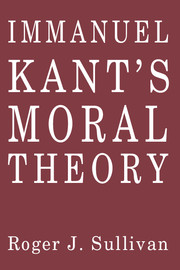Book contents
- Frontmatter
- Contents
- Preface
- Key to abbreviations and translators
- 1 Introduction
- 2 The context for Kant's moral philosophy
- Part I The nature of morality
- Part II The moral norm for persons
- Part III The norm for moral judgment
- 11 The Categorical Imperative
- 12 The Formula of Autonomy or of Universal Law: Part I
- 13 The Formula of Autonomy or of Universal Law: Part II
- 14 The Formula of Respect for the Dignity of Persons
- 15 The Formula of Legislation for a Moral Community
- Part IV Kant on history, politics, and religion
- Appendixes
- Notes
- Bibliography
- Index of names
- Index of subjects
15 - The Formula of Legislation for a Moral Community
Published online by Cambridge University Press: 05 June 2012
- Frontmatter
- Contents
- Preface
- Key to abbreviations and translators
- 1 Introduction
- 2 The context for Kant's moral philosophy
- Part I The nature of morality
- Part II The moral norm for persons
- Part III The norm for moral judgment
- 11 The Categorical Imperative
- 12 The Formula of Autonomy or of Universal Law: Part I
- 13 The Formula of Autonomy or of Universal Law: Part II
- 14 The Formula of Respect for the Dignity of Persons
- 15 The Formula of Legislation for a Moral Community
- Part IV Kant on history, politics, and religion
- Appendixes
- Notes
- Bibliography
- Index of names
- Index of subjects
Summary
The first formula of the Categorical Imperative commands us to act autonomously, to recognize our responsibility to be moral lawmakers in the sense of adopting only maxims fit to serve as the formal structure of an ideal teleological moral world. The second formula commands us to recognize that all persons have objective value and so are obligatory “matter,” requiring us to limit our pursuit of private ends both by self-respect and by respect for others. The third formula is the most comprehensive variation of the Categorical Imperative, combining the Ideas of form and matter stressed in the first and second formulas. (See Gr. 80/436.) Because this formula also calls attention to the nature of the total final good we are to promote, Kant returns again and again to discussions of the Ideas emphasized in it. Yet, because the Idea of the highest good “arises out of morality and is not its basis,” Kant still tells us to use the first formula as our ultimate moral norm (Rel. 5/5; see Gr. 81/436). As a consequence, he offers only a few variations of the third formula, one of which is: “All maxims as proceeding from our own making of law ought to harmonize with a possible kingdom of ends as a kingdom of nature” (Gr. 80/436).
We have seen how often Kant insists that our reason is essentially a teleological faculty; we need ends toward which to direct our rational activity.
- Type
- Chapter
- Information
- Immanuel Kant's Moral Theory , pp. 212 - 230Publisher: Cambridge University PressPrint publication year: 1989



